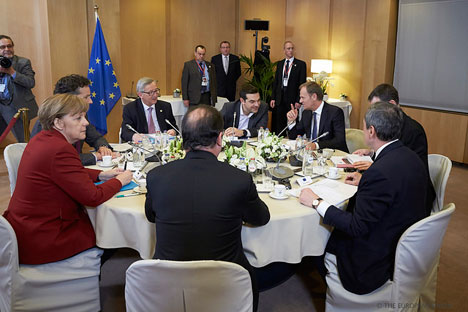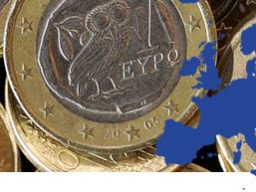German Europe's ascendancy
German dominance of the European Union’s upper echelons has never been greater, writes Eric Bonse. All EU actors are, for now, the pawns of a “German Europe” that is stronger, and yet more vulnerable, than ever before.
During almost a decade in office, the German Chancellor has never been so prominent as now: first in energetically trying to settle the crisis in Ukraine, and then pokering with the newly elected government of Alexis Tsipras about Greek debt remission and whether Greece is to remain in the eurozone. There is no doubt about it: Angela Merkel is certainly the dominant figure in the European Union, prompting citizens and countries alike to start wondering who’s actually in charge of the EU.

Informal meeting on Greece on the margins of the European Council. From left to right: Alexis Tsipras, Greek prime minister; Donald Tusk, president of the European Council; Uwe Corsepius, secretary-general of the council; Mario Draghi, president of the European Central Bank; Fran çois Hollande, president of France; Jeroen Dijsselbloem, president of the Eurogroup; Jean-Claude Juncker, president of the European Commission. Photo: European Council President. Source: Flickr
Jean-Claude Juncker had intended to challenge Berlin’s leadership through his new commission. He had consciously conceived of it as a “political commission”, designed to influence economic policy in particular. Upon assuming office, he immediately countered Merkel’s austerity drive with the announcement of a programme of investment worth billions. Yet however keenly Juncker may stress his policy intentions, he remains well aware of the limits of his powers.
For more than ever before, Brussels is now influenced by German interests and strategies. Largely unnoticed by the public, Germany has taken over key positions in EU institutions and influenced structures that will also tie down Juncker’s self-assured commission. Europe not only speaks German, as CDU parliamentary group leader Volker Kauder proclaimed back in 2011, but thinks and acts in a German manner, and follows models and rules made in Germany too. Yet these rules have brought the EU neither growth nor stability. In fact, they also bear the seeds of conflict and failure.
Germany to the fore, everywhere
German dominance already begins at the EU Commission. Today, the Commission president heads an institution that is populated by more Germans than ever before. This is noticeable in the cabinets – those political departments of the Brussels authority in which EU legislation begins. Germans now pull the strings in almost all 27 of the portfolio commissioners’ cabinets. Thirty-one German advisers in “Team Juncker” are accompanied by just 21 French and 18 British advisers. Luxembourg – Juncker’s home country – contributes only eight. The Germans used to rank third behind the British and the French: they now set the tone.
The German presence among the chefs de cabinet is also considerable. Three other commissioners (Günther Oettinger, Vera Jourova, Neven Mimica) have also chosen Germans. A further five commissioners have deputy heads who are German – including Pierre Moscovici, the EU commissioner for economic and monetary affairs and the foreign policy chief, Federica Mogherini. Berlin is thus extremely well interconnected in these strategic areas too. That said, the German advisers and chiefs of staff do not act as “proconsuls” for Germany – this would be much too simple a view. They have normally followed EU careers and feel more obligated to their commissioners than to the German government itself. However, part of their work is also to remain on good terms with Berlin and to minimize any possible conflicts with the most important EU member right from the outset.
A German-led parliament
The picture is very similar in the two other major EU institutions – the parliament and the council. Germans hold all the important key roles in the European Parliament: Martin Schulz (SPD) is the parliamentary president, Klaus Welle (CDU) is secretary-general and Manfred Weber (CSU) leads the largest, most important parliamentary grouping, the conservative European People’s Party (EPP). Even the committees that decide EU legislation are heavily influenced by the Germans, who head five out of a total of 20 committees – more than any other EU country.
In this way, Germany has assured itself a prominent position in the legislative work of the commission and parliament. Just like in Berlin, the German majority is steered by a grand coalition – currently under the auspices not only of EPP chief Manfred Weber but also of the parliamentary president Martin Schulz. Officially, the social-democratic grouping is led by Gianni Pittella, an Italian; in practice, however, Schulz’s repeated interference ensures that the grand coalition functions in both Brussels and Berlin.
Like Juncker, Schulz thus occupies a pivotal function in the Brussels operation. Although both EU presidents say they are keen to set themselves apart from Chancellor Merkel, in their day-to-day political business they are always careful to minimize any friction and so, ultimately, they serve the German agenda. This explains why Jean-Claude Juncker finds it so hard to establish his own political profile and distance himself from Angela Merkel. But it also explains why he (still) enjoys such major support in Berlin.
“Everyone waits to hear what the Germans have to say”
Different rules apply in the Council of Ministers and the European Council (the “EU’s vanguard”), since there is no grand coalition here and no German dominance. Yet even within the Justus Lipsius building, the Brussels headquarters of the European Council, Berlin sets the tone to such an extent that it sometimes causes embarrassment among German diplomats themselves. “Everyone waits to hear what the Germans have to say” – that is how insiders describe the situation within the Council. Nothing happens without Merkel’s input or against her wishes. But surely it should be the president of the European Council who sets the agenda.
Yet even Herman Van Rompuy was incapable of doing so; now retired, the president of the European Council saw himself more as the boss’s Sherpa than as the boss. However, more is expected of Donald Tusk, Van Rompuy’s successor. The Pole intends to make his own mark, particularly in foreign and security policy – and as boldly as possible, although nobody in Brussels actually expects him to oppose Merkel. After all, it was the German Chancellor who lent Tusk her support right from the start. These two are allied not just by political friendship, but also through the German language, for Donald Tusk speaks German better than English or French, the official languages of the EU. This should make it easier to deal with Uwe Corsepius as well, the Secretary-General of the Council. Corsepius used to be responsible for European policy in the German chancellery and his first official act in Brussels was, at the time, highly controversial: namely, to implement Merkel’s fiscal pact. Since then, everything has gone to plan – Germany’s plan.
Cooperation with other EU institutions such as the European Investment Bank (EIB) and the European Stability Mechanism (ESM) is also going well. Both are located in Luxembourg and are headed by Germans. At the EIB, the FDP politician Werner Hoyer ensures that the programme of investments planned by Juncker as head of the Commission is handled in accordance with Germany’s wishes. And in the case of the ESM, the CDU-aligned Klaus Regling monitors discipline in the crisis-ridden countries, including, needless to add, Greece. A German also has a leading role in the new banking union: Elke König, the former president of BaFin, the Federal Financial Supervisory Authority, who is taking over the leadership of the SRM (Single Resolution Mechanism), which is designed to play a central role in the event of a crisis. This means that the three most powerful institutions involved in resolving the financial crisis are controlled by Germany. Only at the European Central Bank has Germany so far not managed to forge ahead. Here, Jens Weidmann – a former advisor to Merkel and now president of the Bundesbank – is even in a minority.
From a German viewpoint it is now proving to be a handicap that the ECB was modelled on the Bundesbank – in other words, as a politically autonomous institution with a federal structure. However, Mario Draghi, the ECB president, also has to respect German sensitivities. He set up the controversial new bond purchasing programme (“quantitative easing”), such that the Bundesbank was allocated a central role but without Germany having to take responsibility for the other eurozone countries – at least not immediately.
All in all, the German government has secured a central role among the EU institutions. The old complaint of a “pro-French bias” in Brussels has fallen by the wayside; German personnel policy has won the day. Almost all the strategically important positions are now held by Germans, and understandably this is not received with universal enthusiasm. The British Economist ridiculed the “Teutonic Union” and France’s Libération reproached Merkel for single-handedly casting all the lead roles.
A special characteristic of this casting is that some lead roles are reserved not for Germans but for politicians like Tusk or Juncker, who have close ties to the German government. What should have been a forgone conclusion for Europe has a positive function in German Europe: for if German dominance became too obvious, it would be detrimental to German interests. At the same time, all EU actors – and not just the Germans – are integrated into a regulatory framework that turns them into German Europe’s pawns.
German rules
Almost all EU regulations made in recent years show the hand of Germany – starting with the Lisbon Treaty, which remains the EU’s primary law. It was established – during the German EU presidency – with the so-called Berlin Declaration of 2007, following the failure of the constitutional treaty in French and Dutch referenda. The Lisbon Treaty allocates Germany greater voting rights in the EU; the once customary parity with France or the UK is now passé.
In the course of the eurocrisis, the Lisbon Treaty was supplemented by the fiscal union and banking union – again in line with German concepts. The fiscal union makes a Schuldenbremse, or “debt brake”, obligatory for all EU states, while the banking union incorporates wide-ranging exemptions for German financial institutions. The euro rescue fund, or European Stability Mechanism, was also largely structured in accordance with German instructions. Its “fire power” has been restricted and utilization is tied to strict conditions.
Finally, the German government has campaigned for a restrictive economic governance of the eurozone – again with success. While the German current account surpluses, viewed by many experts as partially responsible for the eurocrisis, were granted a kind of general absolution, deficits are now prosecuted more strictly. With the “Six Pack”, the “Two Pack” and “European Semester”, the budgetary policy of the euro states has been confined in a tight corset that leaves hardly any room for anticyclical policies.
Thus the German government was able to oblige the countries in crisis to undergo “growth-friendly consolidation” and “increase their competitiveness”, while proposals from France and other countries largely failed. President François Hollande could neither renegotiate the fiscal pact – a promise he had made prior to his election – nor conclude a genuine growth pact. Both moves failed because of Germany’s opposition and the eurozone is still suffering as a result.
Berlin also thwarted Jean-Claude Juncker’s investment plan by preventing access to unutilized funds from the ESM. Meanwhile, the German government is attempting to establish rules that mean the investments cannot be politically controlled. Nonetheless, the last word on the Juncker plan has yet to be uttered. Above all, the European Parliament is endeavouring to redefine the plan as a major growth initiative. However, results are not expected before June.
In contrast to which, it is already clear that the EU is now largely run according to German rules, and that this will continue to be the case – even under the new EU commission. However, this manner of regulation is less obvious than the massive presence of German advisers and politicians in Brussels. EU rules do not bear German names or German passports. Jean-Claude Juncker and his commissioners follow them without need of a helping hand from Chancellor Merkel. You could say that these rules are written into the European DNA.
So who actually governs the EU? This is the wrong question. German Europe does not need a government in order to get its own way. It has already been constituted with the help of individuals in institutions and regulations – well beyond anything that someone like Ulrich Beck could have been foreseen. The “Merkiavellianism” once pilloried by Beck has, to a certain extent, become obsolete. The Chancellor no longer needs to play everyone off against each other – she lets them play for her.
But this is not a closed, consistent system. The grand coalition supporting German Europe is inherently inconsistent and will not last forever. This applies to both Berlin and Brussels. Juncker and Schulz, who hold this coalition together at European level, have forged a temporary alliance at best. Within the Council too, German dominance is not guaranteed. France and Italy have been trying, for some time, to establish a counterbalance. The new Greek government also raises additional concerns in this respect.
So in the end, German Europe is not chiefly held together by individuals, but by rules – just as the “ordoliberal” school of thought demands. Yet these rules have brought Europe neither growth nor stability. They are fragile, in need of enhancement or even failing. They are also no longer recognized by all EU countries – in fact, quite the opposite: Greece, alongside the UK and Hungary, is more or less openly laying down a challenge to the rules. In short: German Europe is stronger, but at the same time more vulnerable, than ever before.
Published 24 April 2014
Original in German
Translated by
Carole Porter
First published by Blätter für deutsche und internationale Politik 3/2015 (German version); Eurozine (English version)
Contributed by Blätter für deutsche und internationale Politik © Eric Bonse / Eurozine
PDF/PRINTPublished in
In focal points
Newsletter
Subscribe to know what’s worth thinking about.




